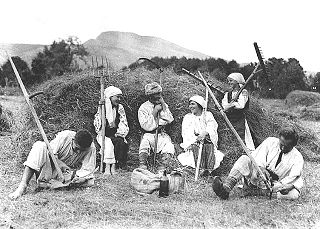Peasants' Party (Romania)
In the years between Romania's proclamation as a Kingdom and c. 1919, local political life had been dominated by two major parties, the National Liberals (or PNL) and the Conservatives (or PC).
In addition, Romania's Old Kingdom (Moldavia and Wallachia) kept its traditional restrictions of civil rights for persons of religions other than Eastern Orthodox, which progressively (after selective integrations) applied only to Jews (until 1923); since such a regime implied than many professions were not accessible to the non-Orthodox, the excluded communities directed their efforts towards several niches, including leasehold estates that drew hostility from landless peasants who were generally underpaid for work provided (a source for the partially antisemitic message of the 1907 revolt).
The Peasants' Party was founded in Bucharest on December 18, 1918, around a group of rural intelligentsia (mainly teachers and priests) led by Ion Mihalache, "as the only political instrument ensuring the full and honest fulfilment of the peasantry's material and spiritual needs".
[1] The PȚ also described its position as "a means to protect [the peasantry] from both Bolshevism and the fate reserved to it by the boyar parties[2] to become a governmental dowry they aim to use for their own gains".
Especially considering its recent emergence, the Party registered a major success in the 1919 Parliament elections (61 seats), as well as the presidency of the Chamber and Senate (Mihalache and Bujor respectively) and positions in the cabinet of Alexandru Vaida-Voevod.
As General Alexandru Averescu (leader of a competing peasant movement, the People's Party) was charged by the King with forming his second cabinet, the PȚ leadership made public its fears that the move was merely a means for the PNL to ensure a transitional period before yet another mandate.
It was isolated for a while in 1921, when Nicolae Iorga attacked the PȚ's Constantin Stere for his support of the Central Powers during the war, a criticism echoed by all political forces.
